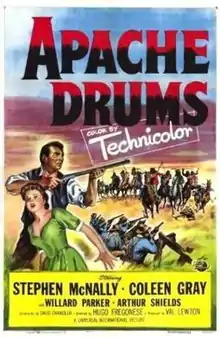| Apache Drums | |
|---|---|
 Theatrical release poster | |
| Directed by | Hugo Fregonese |
| Screenplay by | David Chandler |
| Story by | Harry Brown |
| Based on | His original story "Stand at Spanish Boot" |
| Produced by | Val Lewton |
| Starring | Stephen McNally Coleen Gray |
| Cinematography | Charles P. Boyle |
| Edited by | Milton Carruth |
| Music by | Hans J. Salter |
| Color process | Technicolor |
Production company | Universal Pictures |
| Distributed by | Universal Pictures |
Release date |
|
Running time | 75 minutes |
| Country | United States |
| Language | English |
| Budget | $395,000[1] |
| Box office | $1.4 million (US rentals)[2] |
Apache Drums is a 1951 American Western film directed by Hugo Fregonese and produced by Val Lewton. The drama features Stephen McNally, Coleen Gray, and Willard Parker. The film was based on an original story: Stand at Spanish Boot, by Harry Brown.[3] Apache Drums was the last film Val Lewton produced before his death.[4]
Plot
A notorious gambler is thrown out of a small town named Spanish Boot, but he quickly returns when he discovers the town is threatened by the Mescalero Apaches led by Chief Victorio.
Cast
- Stephen McNally as Sam Leeds
- Coleen Gray as Sally
- Willard Parker as Joe Madden
- Arthur Shields as Reverend Griffin
- James Griffith as Lt. Glidden
- Armando Silvestre as Pedro-Peter
- Georgia Backus as Mrs. Keon
- Clarence Muse as Jehu
- Ruthelma Stevens as Betty Careless
- James Best as Bert Keon
- Chinto Guzman as Chacho
- Ray Bennett as Mr. Keon
Production
Val Lewton wrote a script for a story about the American Revolution, Ticonderoga, and sent it to various studios including Universal. Universal liked the script and signed Lewton to develop it. The studio decided not to make that film but assigned Lewton to Apache Drums instead.[1]
The film was based on a story called Siege at Spanish Boot which had been bought by Universal in May 1950.[5] It was known during production as War Dance.[6]
The film was shot in Apple Valley and the Mojave Desert in California.
In contrast with his experiences at Paramount and RKO, Lewton enjoyed working at Universal. The studio wanted to make more films with Lewton and he was interested but instead he accepted an offer to work for Stanley Kramer just before his death of a heart attack in 1951.[1]
Reception
Box Office
The film was successful at the box office.[7]
Crticial
When the film was released The New York Times gave the film a mixed review and wrote, "Apache Drums is tense and exciting fare when its green and red-painted Indians, yelping and keening, ride to attack or literally bite the dust with authentic thuds. When it is loquaciously appraising its principals, it is, to quote one of them, 'kind of dull and tame.'"[8]
Recently, film critic Dennis Schwartz reviewed the film favorably, writing, "It's the kind of effective kickass B western where the cavalry comes in the nick of time to rescue the white folks from the attacking Indians. Director Hugo Fregonese (Untamed Frontier) gives a nod to Lewton's eye for detail and shadowy photography...David Chandler turns in a crisp screenplay that's always tense and filled with exciting action sequences except when he keeps things too chatty, which tamps down the narrative with a dull soap opera romantic feud...Pretty darn good stuff for such a modest western, showing that it takes all kinds to be brave and that the worst situation might bring out the best in a man."[9]
Time Out London's review was also complimentary, writing, "Beautifully staged by Fregonese, especially the climactic attack on the church where the survivors make their stand, with painted Apaches erupting through the high windows like demons from hell. Val Lewton's last production, it is full of touches instantly recognisable from his RKO series: the subtle ambivalence undermining attitudes and ethical principles, the generous stance against racism, the concern for childhood (the gambler distracts the frightened kids with an exhibition of sleight of hand), the love of traditional songs (the kids led into a chorus of 'Oranges and Lemons'; the minister countering the Apache chanting by launching into 'The Men of Harlech')."[10]
References
- 1 2 3 Siegel, Joel E (1973). Val Lewton: the reality of terror. Viking Press. p. 96-98.
- ↑ "Top Grossers of 1951". Variety. January 2, 1952. p. 70.
- ↑ Apache Drums at IMDb .
- ↑ Erikson, Hal. Apache Drums at AllMovie.
- ↑ "Briefs from the lots". Variety. May 10, 1950. p. 16.
- ↑ "Briefs from the lots". Variety. August 16, 1950. p. 20.
- ↑ "$13,427,000 Gross For 1st Qtr. Reflects Big Payoff to U on Comball Pix". Variety. April 2, 1952. p. 7.
- ↑ New York Times, film review, "Cavalry Arrives in Nick of Time", May 7, 1951. Last accessed: February 11, 2011.
- ↑ Schwartz, Dennis Archived October 7, 2010, at the Wayback Machine. Ozus' World Movie Reviews, film review, November 12, 2006. Last accessed: February 11, 2011.
- ↑ Time Out London Archived July 17, 2011, at the Wayback Machine Film review. Last accessed: February 11, 2011
External links
- Apache Drums at IMDb
- Apache Drums at AllMovie
- Apache Drums at the TCM Movie Database
- Apache Drums at the American Film Institute Catalog
- Apache Drums at Letterbox DVD